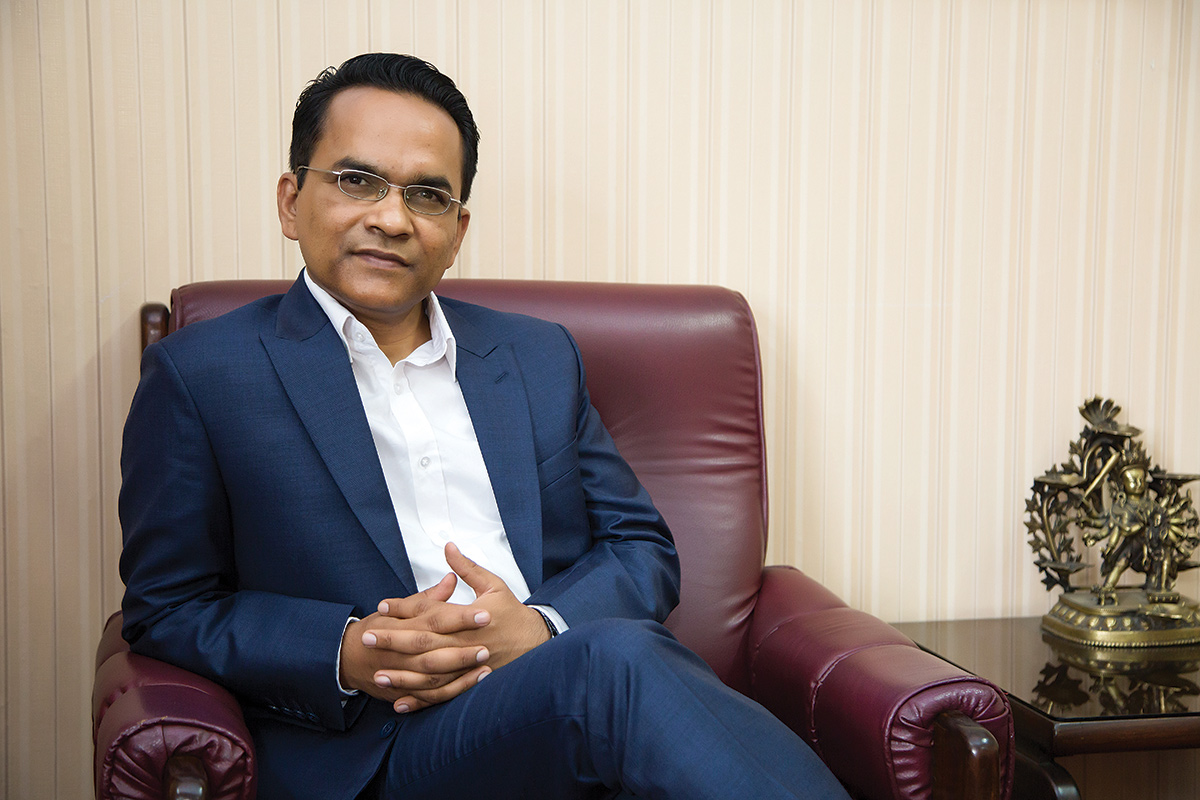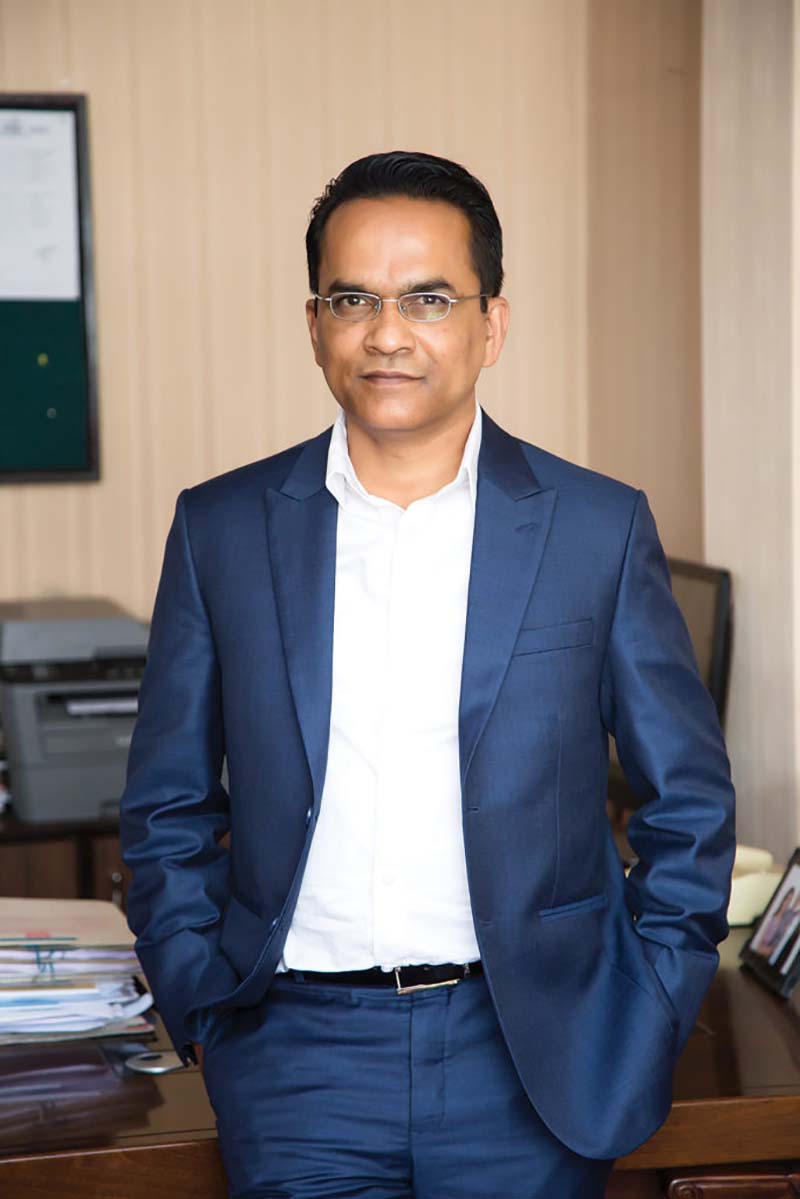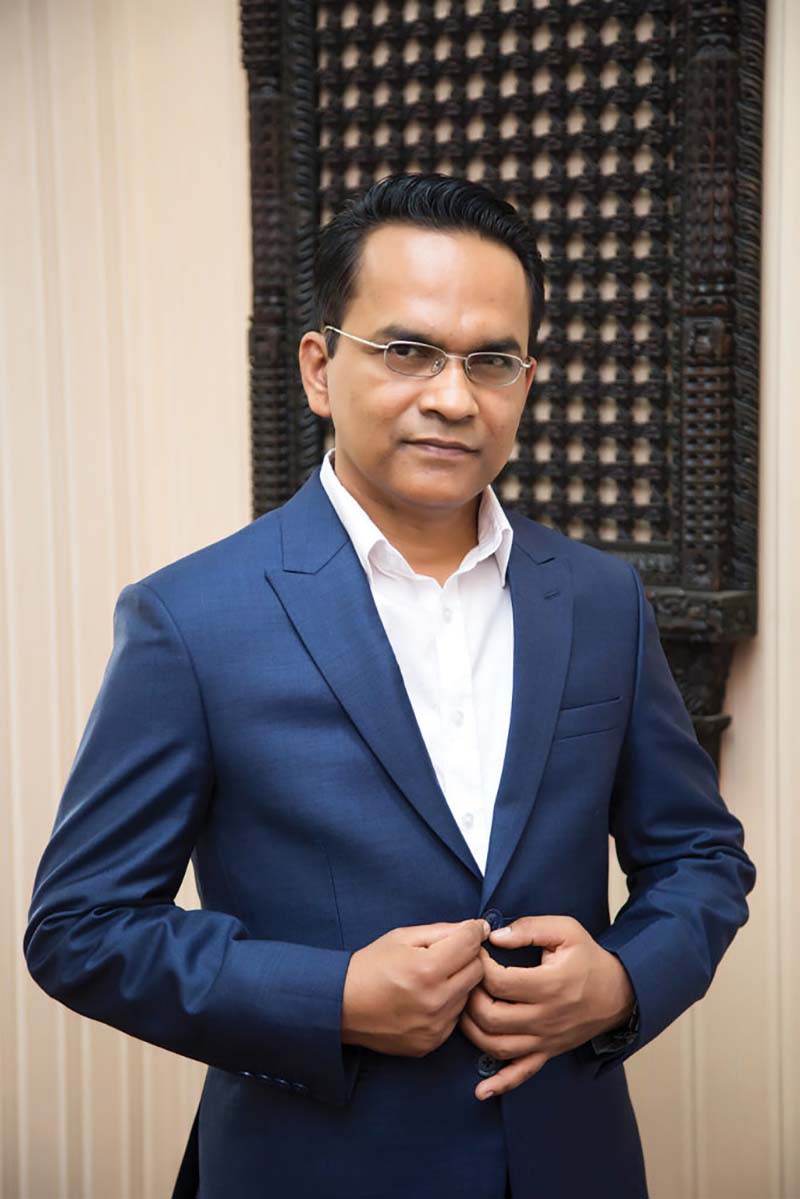
“Nepal could be a lot better than what it is today. But we haven’t done the things that are necessary for better development. It could be either because we are weak in our planning or we haven’t developed the capacity to implement development works at the desired level. May be, it is because we lack discipline in our work or we are happy just sending people abroad to work. Or maybe, we are more focused on consumption rather than development. I feel these are the things that have affected us. I always say a lot of people have done a lot to make our country poor and underdeveloped. I feel I can contribute to getting rid of these problems and that is what drives me”
It was only while studying for his Master's degree that Dr Biswo Nath Poudel, Vice Chairman of the National Planning Commission developed an interest in economics. Initially, he says, he was more inclined towards mathematics and engineering and had even taken up engineering. Dr Poudel relates that during his Bachelor’s degree in Shanghai, he was influenced by some Chinese associates who made him probe the importance of economics in nation building. “They used to say they had many engineers in the country and China could produce a lot of goods but very few people were actually into economics,” he recalls. After completing his Master's degree in the United States he thought of pursuing a doctorate in maths but decided against it. “I wanted to get into something a bit more philosophical and I also realised I could contribute more to Nepal if I studied economics,” he reminisces.
It was around this time that he also started to develop an interest in the economic history of the US and China. “I opted for economics for my doctorate and have had no regrets whatsoever.” A choice that has held him in good stead and defining a career path.
At present, leading the apex planning body of the country, there are multiple responsibilities and challenges on his shoulders and he is working with a single minded focus to create important adjustments to ensure Nepal is on the path to a progressive economy.
In this issue, Business 360 caught up with Dr Poudel to learn more about his role and vision working for the National Planning Commission, the outcomes and challenges, among other related topics. Excerpts:



What are the main challenges at the National Planning Commission currently?
I was appointed three months back and within this period I have identified a few challenges. Since we are a planning body the first thing we have to be clear about is how we can plan properly. And then it is about how we can monitor and evaluate projects and programmes in a more effective manner. At the moment it is about formulating proper plans. The 15th five-year plan which we had earlier drafted needs to be reviewed now as the Coronavirus pandemic has changed many dynamics of the economy. The other issue is that there have been questions raised about the reliability and credibility of the project bank we have created. That’s one aspect we need to deal with in the immediate future. The programmes that we run need to be exemplary. The other aspect we need to be aware of is the country has adopted a federal structure of governance and there are planning bodies in the provinces too. Hence, we need to have efficient coordination and provide necessary support to those bodies. Even after having adopted the federal structure quite some time back, we still have not been able to develop coordination with provincial bodies in a proper manner. Moreover, monitoring and evaluation also need to be ramped up as project implementation is not as expected. We also need to address the problem of low capital expenditure and this has become a major issue in recent times.The NPC is a central body. How relevant do you think is it in today’s world? Do you think such a body is necessary?
The first thing we need to realise is that any country will have a government. Or you have to say we don’t need a central government. And when there is a government, there have to be plans. Do we run a government without any plans? What people are actually saying is we don’t need a very domineering style of planning body where everything is looked by it. Previously, in some countries, the central planning bodies looked into everything from output to consumption pattern. They fixed practically everything. People are saying they do not need that type of planning structure, they are not saying they do not need any planning at all. The planning that we do in our country is of a different model. It is not that we try to have an impact on the behavioural pattern of the people at the micro level. We are here to see how we can take forward the government expenditure in a more efficient and sustained way. Also, the beginning of our planning body is quite different from that of other countries. We are an institution that is nearly seven decades old. It was after we got rid of the authoritarian style of governance, we decided to set up a planning commission so that we could formulate better plans for the overall development of the country. The NPC has the duty to draft plans and programmes and the government is responsible for their implementation. We also monitor and evaluate whether the plans have been implemented the way we wanted them to be. The concept behind our planning body was to counter the negativity of the authoritarian rule we had previously. Even today, I feel nobody should speak against an institution like ours that has such a long and rich history just for the sake of it.The economic environment in the country is mercurial with multiple challenges globally and nationally. What are some of the positives and negatives in your opinion of the time and situation we are in?
Everybody knows India and China have booming economic activities. So the first thing we need to do is think of how we can take benefit from our neighbours. We have the potential to generate a huge quantum of electricity and also sell surplus energy to India and Bangladesh. So how can we work to materialise that potential? We need to think if India in the near future becomes a manufacturing giant how can we become a part of it. China is already a manufacturing giant so we need to see how we can connect with them. What can we give and what can we receive? We have for the major part remained clueless on those issues. We have to tap into the possibility of connecting with India and China and reap more benefits.The 15th five-year plan which we had earlier drafted needs to be reviewed now as the Coronavirus pandemic has changed many dynamics of the economy. The other issue is that there have been questions raised about the reliability and credibility of the project bank we have created. That’s one aspect we need to deal with in the immediate future.The other thing is that the world economy today is more inclined towards the service sector and information technology. In the past, we often said we are a landlocked country and we do not have access to ports and that has been hurting our economy and overall development process. But with the rapid development of IT and transportation systems in the last couple of decades, it is time we got out of that mindset and learn to adapt and utilise what we have. I believe the service sector and IT can bring more economic opportunities to the country.
With all the uncertainty brought on by Covid, we need to revisit the 15th five-year plan. What are the areas you will be majorly focusing on?
The Covid pandemic hit us towards the beginning of last year and I must say no government across the world was prepared for the crisis it would bring about. The pandemic did hurt our economy in a major way and now the floods have affected our agriculture sector. Paddy is one crop that has a major contribution to our economy but the paddy fields have been inundated due to the unseasonal rains. Due to these reasons, we have felt the need to review the 15th five-year plan. We will be looking at revising the main indicators of the plan like the growth rate and expenditure target, among others.How do you view the influence of business on politics, governance and now the judicial system in the country?
If the government fulfils its responsibility, then there will never be any such issue. Our responsibility is how to allow businesses to work in a competitive environment. The only thing I hope is they do not develop into rent-seeking organisations. As a government body, we need to protect their property rights, which is our responsibility. Actually, there are relatively fewer chances of businesses being able to influence us. I don’t believe they have that much sway. The government normally works independently for the good of businesses and their rights. Business is a major sector and we need to make sure there is growth in that sector. But we also need to equally look after the rights of the consumers the way we look after businesses. We have to look at the welfare of the people too. As a nation, we have many constituencies and business is one among them. I don’t feel they have an outsized influence on the government.There is a lot of focus from the government on startups and entrepreneurship but are these our real strengths as a country?
Entrepreneurship is a real need for any country and not only Nepal. The more we can promote entrepreneurship and startups the better will the country’s economy be. The more we are commercialised the better it is and I am for that. NPC itself has set up a Rs one billion startup fund and we are planning to work accordingly. Overall, the way we work with entrepreneurship is when other ministries have programmes that deal with employment generation, we look into how we can focus on entrepreneurship. A lot of emphases is laid on that. Even when running welfare programmes, we hope to have a positive impact on micro entrepreneurs. Our concept is not to just spend the money but be able to generate economic activities too. For instance, if I sell you a smartphone for Rs 100 the value of that phone for me is less than Rs 100. That is why I am offering you the phone at that price. However, the value of the phone may be more than Rs 100 for you personally and that is why you buy it. If you valued that phone at less than the price I quoted, you wouldn’t be buying it. Every transaction shows that both the seller and buyer are happier. So, transactions make people happier. Entrepreneurship helps increase economic activities. And each economic activity makes people happier. The more economic activities in the country the happier the people become. Hence, we are trying to develop more entrepreneurs as they are the ones who become producers of goods and services. If any entrepreneur develops a new product that will have a major positive impact on the economy, we need to promote those entrepreneurs. In the case of startups, the more risks we can share with the younger generation the better it is. We don’t want young people to go just for jobs. They should start some business, take a few risks. But the risks should not endanger their entire life. They should not face difficulties throughout their life. That is how we are thinking. Youths should take risks but not undue risks.How do you envision filling the economic gaps created by the pandemic, natural disasters, political deadlock? How do you view this from the common man’s perspective?
The first thing we need to do is provide them compensation. Previously too we had provided compensation. Even during the major earthquake in 2015 when our economy was hit massively, we did provide relief to those who were affected. Even now a committee has been formed under the coordination of the secretary of the Home Ministry. They are calculating the losses. There are some funds available and there are a couple under my jurisdiction too. We are in the process of trying to dispatch the relief at the earliest. The government has also announced certain relief measures. We will help those who have been affected. The Nepali Congress has a long history of promoting agri insurance and livestock insurance. We have been focused on quality for long. We will bring some programmes may be of cash transfers too, whatever it takes. We will work for the welfare of disadvantaged people.
What are the values you are driven by when planning?
There are some aspects that a nation has to always be aware of - land for people, capital, employment and social security. People should have access to at least one of these components and we need to ensure that. The second thing is there should be overall prosperity in the country. Simultaneously there should be a reduction in inequality. The third we always lay stress on is liberty or freedom. These are the things political parties in our country have believed in since the advent of democracy in our country. They care about prosperity and the reduction of inequality. I look into these aspects and see how the country can be developed and be made more internationally competitive. Opportunities should not be missed and resources should not be wasted.What are the most immediate policy reforms you feel that must be addressed to create a better economic and work culture?
We are in a lame duck situation at the moment with elections going to be held in about a year’s time. However, we need to look into deregulation. About 25 to 30 years back our economy was very free and if you wanted you could open a bank or an insurance company or a school in a relatively easy manner. The environment back then for investment was quite free. But now we are again back to the licensing system. We need a licence to start anything. At the moment, if you want to open a new bank you cannot. It is so difficult. Barriers to investment have been put in place now. So, we need to remove this rent-seeking culture. We should not allow wealth to be concentrated among only a few people. This can be seen more in the service sector.The country definitely needs to be on the path of prosperity but there shouldn’t be a rise in inequality. The policies should be framed in such a way that the inequality between people should not rise.We fought against authoritarian rule to bring in democracy for that very purpose. About 50 to 60 years back too when wealth was concentrated among a few rich people the government back then fought to abolish that trend. When wealth is concentrated among only a few people and there is rent-seeking culture then the country loses out in the long run. The country definitely needs to be on the path of prosperity but there shouldn’t be a rise in inequality. The policies should be framed in such a way that the inequality between people should not rise. So, there are some reforms needed in this area and we are preparing for that too. But for reforms in our country, we need a political mandate. We can’t have major reforms just before the elections but we are preparing for that.
How do you view the banking industry which many experts feel has been given too much impetus in the country?
At present, banks have a tremendous amount of deposits and at times we wonder have they become bigger than the ministries? It looks like that. Previously, it was not like that but now may be because our economy has gone towards monetisation banks have a lot of savings with them. But having said that I must say that banking does good for the economy and we had been focusing on that for a long time. The only concern is we should take banks to all the rural areas. Access to finance means access to loans, access to credit. It is not access to savings. Poor people do not need to think of where to save their money. They are worried about where they can get the finances to start something. May be to start a business or may be modernise their agriculture practice. The feeling is that the banking industry has still not been able to serve that purpose to the level we expect at the moment. We need to push that agenda. For instance, farmers need to develop their technology and that can happen only if they have the money. We need to push banks to provide easy access to credit in rural areas. The banks in our country have been doing that and I would say we just need a slight improvement.What are the immediate challenges to the economy and how can they be resolved?
The major challenge at the moment is the instability in the interest rate for credit. For example, the interest rate on credit has been raised recently. We want to make sure that such fluctuations do not happen. I talk to the Governor and also the Finance Minister regularly on this issue. I want to make sure that the interest rate does not spike up in such a manner. When credit rates are hiked it demotivates people from setting up new ventures or expanding existing ones. Just because the interest rate on savings increases it does mean rates on credit also need to be hiked. This particular phenomenon has been worrying me.What are the values that drive you as a person and as a professional?
I feel our country has the potential to do more than what has been done till date. Nepal could be a lot better than what it is today. But we haven’t done the things that are necessary for better development. It could be either because we are weak in our planning or we haven’t developed the capacity to implement development works at the desired level. May be, it is because we lack discipline in our work or we are happy by just sending people abroad to work. Or maybe, we are more focused on consumption rather than development. I feel these are the things that have affected us. I always say a lot of people have done a lot to make our country poor and underdeveloped. I feel I can contribute to getting rid of these problems and that is what drives me. READ ALSO:
Published Date: November 15, 2021, 12:00 am
Post Comments
E-Magazine
RELATED In the Lead



-1749018895.jpg)